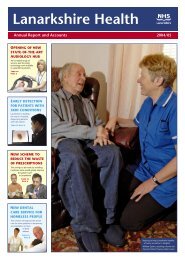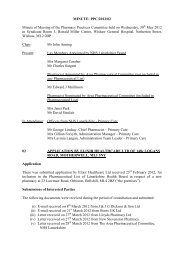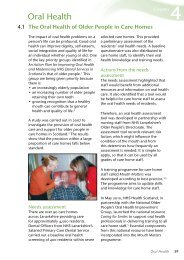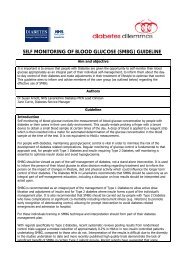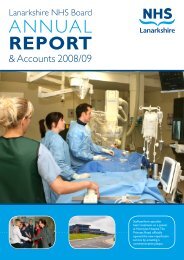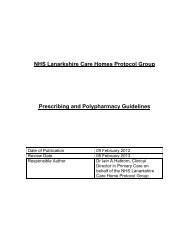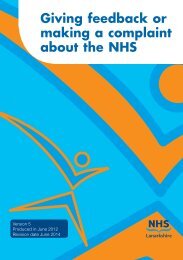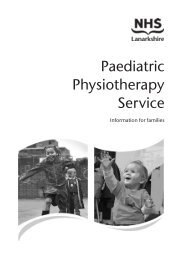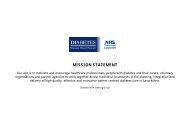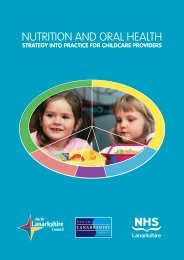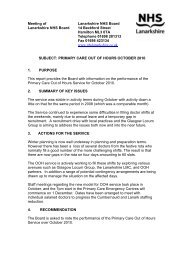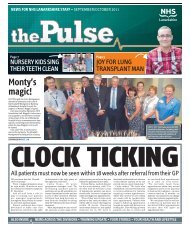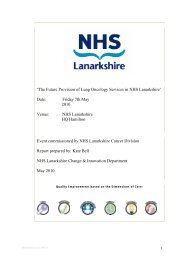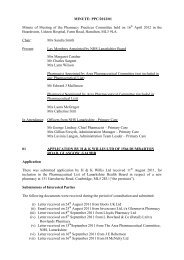Cancer Strategy Report - A Framework for NHS Lanarkshire - June ...
Cancer Strategy Report - A Framework for NHS Lanarkshire - June ...
Cancer Strategy Report - A Framework for NHS Lanarkshire - June ...
Create successful ePaper yourself
Turn your PDF publications into a flip-book with our unique Google optimized e-Paper software.
<strong>Cancer</strong> <strong>Strategy</strong><br />
A <strong>Framework</strong> <strong>for</strong> <strong>NHS</strong> <strong>Lanarkshire</strong><br />
<strong>June</strong> 2013 - <strong>June</strong> 2016
<strong>NHS</strong> <strong>Lanarkshire</strong> is committed to promoting<br />
equality of opportunity, recognising that<br />
there is no equality of opportunity if the<br />
difference is not recognised and valued.<br />
Reducing health inequalities and promoting<br />
equality should be everyone’s business.<br />
Access to and outcomes from health services<br />
can be affected by various factors including;<br />
age, disability, gender reassignment,<br />
marriage and civil partnership, pregnancy<br />
and maternity, race, religion or belief, sex,<br />
sexual orientation (Equality Act 2010) and<br />
socio-economic factors.<br />
This strategy reflects <strong>NHS</strong> <strong>Lanarkshire</strong>’s<br />
commitment to equality and diversity.
Contents<br />
Page<br />
1.0 Executive Summary 4<br />
1.1 <strong>Cancer</strong> Centre 5<br />
2.0 <strong>Cancer</strong> Prevention 7<br />
2.1 Early Detection of <strong>Cancer</strong> 8<br />
2.2 Screening Programmes 9<br />
2.3 Detecting <strong>Cancer</strong> Early (DCE) 11<br />
3.0 Genetic and Molecular Testing 12<br />
4.0 Referral and Diagnosis 13<br />
4.1 Current Standards 13<br />
4.2 Referral Processes 14<br />
4.3 Diagnostic Tests 15<br />
5.0 Treatment 16<br />
5.1 Surgery 16<br />
5.2 Chemotherapy 17<br />
5.3 Acute Oncology/Oncology Emergencies 18<br />
5.4 Radiotherapy 18<br />
6.0 Living with and Beyond <strong>Cancer</strong> 19<br />
6.1 <strong>Lanarkshire</strong> <strong>Cancer</strong> Improvement Programme 19<br />
6.2 New models of Follow Up 19<br />
6.3 Working with the third sector 20<br />
6.4 Supporting the integration of health and social care 20<br />
6.5 Palliative Care 22<br />
6.6 Improving the Quality of Care 23<br />
6.7 Managed Clinical Networks 24<br />
6.8 eHealth 24<br />
6.9 Telehealth 24<br />
6.10 Funding <strong>Cancer</strong> Care in <strong>NHS</strong> <strong>Lanarkshire</strong> 25<br />
7.0 Delivery of <strong>NHS</strong> <strong>Lanarkshire</strong>’s <strong>Cancer</strong> <strong>Strategy</strong> 27<br />
7.1 Clinical Leadership 27<br />
7.2 Regional <strong>Cancer</strong> Networks and Managed Clinical Networks (MCNs) 27<br />
7.3 Work<strong>for</strong>ce Planning 28<br />
<strong>Cancer</strong> <strong>Strategy</strong> <strong>Report</strong> - A <strong>Framework</strong> <strong>for</strong> <strong>NHS</strong> <strong>Lanarkshire</strong> - <strong>June</strong> 2013 - <strong>June</strong> 2016
1.0 Executive Summary<br />
<strong>Cancer</strong> services have changed substantially over the years and will continue to evolve.<br />
The number of people diagnosed with cancer is rising, reflecting the impact of<br />
Scotland’s ageing population as well as improvements in diagnosis. The largest<br />
increase will be in the elderly. Additionally, more people will live <strong>for</strong> longer with<br />
their cancer diagnosis as treatments improve.<br />
Appropriate prevention, screening, diagnosis, treatment and rehabilitation and<br />
support services will be required to address the changing cancer agenda.<br />
<strong>NHS</strong> <strong>Lanarkshire</strong> has undertaken significant work to address these elements<br />
over recent years. However we need to continue improve the way our services<br />
are delivered.<br />
This strategy document sets out how we will develop cancer care in <strong>Lanarkshire</strong><br />
over the next seven years.<br />
In line with the <strong>NHS</strong> Scotland Quality <strong>Strategy</strong> the service will continue to be person<br />
centred, safe and effective. Any changes will also reflect the Scottish Government’s<br />
national vision <strong>for</strong> cancer services as outlined in Better <strong>Cancer</strong> Care.<br />
Locally, <strong>NHS</strong> <strong>Lanarkshire</strong>’s framework A Healthier Future sets out the strategic<br />
aims which should underpin all service planning and these have in<strong>for</strong>med the<br />
development of the cancer strategy. These are:<br />
• To reduce health inequalities and enhance cancer prevention to improve<br />
life expectancy<br />
• To support people to live independently at home through integrated health<br />
and social care working<br />
• To improve palliative care and supported end of life services<br />
• For hospital day case treatment to be the norm, avoiding admissions<br />
where possible<br />
A stakeholder event was held in <strong>June</strong> 2012 and this outlined the priorities <strong>for</strong> service<br />
development. The event highlighted the need <strong>for</strong> integrated services which cover<br />
each stage of cancer care from improving public awareness and prevention through<br />
to diagnosis, treatment, follow-up care and rehabilitation and end of life care. In the<br />
development of this strategy we have taken account of the recommendations from the<br />
event.<br />
This means collaborative working with statutory agencies as well as the third and<br />
independent sectors, to provide the right treatment and support at the right place<br />
and at the right time.<br />
4 | <strong>Cancer</strong> <strong>Strategy</strong> <strong>Report</strong> - A <strong>Framework</strong> <strong>for</strong> <strong>NHS</strong> <strong>Lanarkshire</strong> - <strong>June</strong> 2013 - <strong>June</strong> 2016
The essence of the strategy is the augmentation of<br />
• Prevention and early detection of cancer<br />
• Provision of high quality treatment<br />
• Support <strong>for</strong> people with a diagnosis of cancer so they can live full and<br />
independent lives within their home and local communities.<br />
Our aim is to develop an adaptable, flexible service that meets the needs of everyone<br />
in <strong>Lanarkshire</strong> who is affected by cancer.<br />
As we work towards achieving the goals set out in this document we will continue to<br />
engage with our staff, patients, carers and other key stakeholders.<br />
This strategy is <strong>NHS</strong> <strong>Lanarkshire</strong>’s vision to deliver better cancer care <strong>for</strong> the<br />
population of <strong>Lanarkshire</strong> based on the key themes set out in the Scottish<br />
Governments Document Better <strong>Cancer</strong> Care, An Action Plan (2008).<br />
1.1 <strong>Cancer</strong> Centre<br />
The review of <strong>Lanarkshire</strong>’s clinical services, “A Picture of Health”, was concluded<br />
in February 2008. One significant outcome was the recognition of the benefit to the<br />
care and treatment of people diagnosed with cancer through concentrating some of<br />
these services on one hospital site. Monklands was identified as the site best suited<br />
to do this.<br />
The benefits of this approach will lead to improved outcomes <strong>for</strong> patients through:<br />
• Improved access to the multidisciplinary specialty team<br />
• Opportunities to further develop the provision of high quality, co-ordinated<br />
care and improve continuity of care<br />
• Sustainability of the clinical work<strong>for</strong>ce<br />
• Enhanced opportunities to retain and recruit healthcare staff and to develop<br />
training and expertise to enable further expansion of their role.<br />
• Improved environment <strong>for</strong> complex day case procedures<br />
• Opportunity to provide expanded, dedicated outpatient services<br />
However, the <strong>NHS</strong> Board appreciate that the benefits of this approach to<br />
concentration of services must be balanced against the very real value placed by<br />
patients and their carers on having local access to services close to home. In all cases<br />
this benefit must be weighed against any of the advantages of concentrated services.<br />
<strong>Cancer</strong> <strong>Strategy</strong> <strong>Report</strong> - A <strong>Framework</strong> <strong>for</strong> <strong>NHS</strong> <strong>Lanarkshire</strong> - <strong>June</strong> 2013 - <strong>June</strong> 2016 | 5
There are no plans at present to concentrate all cancer services at Monklands in a<br />
single building or department. The current estate is a limiting factor and does not<br />
allow such a development. In that respect this will be a “virtual” cancer centre with<br />
services located across the Monklands campus. However, and future plans <strong>for</strong> the<br />
hospital will take cognisance of the cancer strategy, and seek to provide the best-fit <strong>for</strong><br />
the future development of services.<br />
It is fully recognised that a significant proportion of services will continue to be<br />
provided at Hairmyres, Wishaw and other locations <strong>for</strong> patients within those hospital<br />
catchment areas, <strong>for</strong> example the administration of chemotherapy, or routine followup<br />
outpatient appointments where there is no added value to patients in concentrating<br />
at Monklands.<br />
Since the agreement to proceed in 2008, this strategy has led to some significant<br />
developments at Monklands:<br />
• Concentration of inpatient haematology<br />
• Re-configuration of the dermatology day treatment areas<br />
• Provision of the <strong>Lanarkshire</strong> lung oncology outpatient clinic<br />
• Building of the <strong>Lanarkshire</strong> Maggie’s centre (opening spring 2014)<br />
• Location of a state-of the art MDT room with telelinks across Scotland<br />
and beyond<br />
Other developments under consideration are:<br />
• Potential to build a regional satellite radiotherapy unit<br />
• Locating <strong>Lanarkshire</strong>’s histopathology services at Monklands<br />
6 | <strong>Cancer</strong> <strong>Strategy</strong> <strong>Report</strong> - A <strong>Framework</strong> <strong>for</strong> <strong>NHS</strong> <strong>Lanarkshire</strong> - <strong>June</strong> 2013 - <strong>June</strong> 2016
2.0 <strong>Cancer</strong> prevention<br />
Preventing cancer is a local and a national priority and will play a major part in the<br />
reduction of cancer deaths and ill health. It involves the promotion of health and<br />
well being, the reduction of cancer risk factors and the early detection of cancer.<br />
Prevention will have a strong focus on reducing inequalities in cancer mortality.<br />
There is evidence that action on a range of lifestyle and environmental factors will<br />
help to reduce the risk factors associated with cancer. Local priorities include:<br />
• Supporting the reduction of health inequalities<br />
• Reduction in smoking prevalence and protecting people from exposure to<br />
tobacco smoke<br />
• Improving diet and nutrition<br />
• Reducing obesity and improving weight management<br />
• Reducing alcohol consumption<br />
• Reducing environmental risk through skin cancer prevention interventions<br />
• Improving participation (through in<strong>for</strong>med consent ) in national cancer<br />
screening programmes to help detect cancer earlier<br />
<strong>NHS</strong> <strong>Lanarkshire</strong> is committed to reducing premature deaths and is investing in<br />
prevention programmes to prevent the onset of cancer. In its strategic priority<br />
“Delivering things that make a big difference” <strong>NHS</strong> <strong>Lanarkshire</strong> recognises the<br />
importance of tackling the biggest killers and focusing on inequalities.<br />
It is important to recognise that wider life circumstances such as employment status<br />
and educational attainment impact on overall health status and lead to inequalities in<br />
morbidity and mortality (Equally Well, 2008). Strategies to prevent cancer there<strong>for</strong>e<br />
have to address both lifestyle issues and wider determinants of health. The Single<br />
Outcome Agreements and Community Plans that have been developed <strong>for</strong> both<br />
local authority areas outline a range of actions to improve life circumstances and<br />
life chances including early intervention, employment and lifelong learning, social<br />
inclusion and regeneration.<br />
<strong>Cancer</strong> <strong>Strategy</strong> <strong>Report</strong> - A <strong>Framework</strong> <strong>for</strong> <strong>NHS</strong> <strong>Lanarkshire</strong> - <strong>June</strong> 2013 - <strong>June</strong> 2016 | 7
<strong>NHS</strong> <strong>Lanarkshire</strong> AND PARTNERS WILL<br />
• Continue to implement the <strong>Lanarkshire</strong> Tobacco Control <strong>Strategy</strong> (2012-2015).<br />
• Continue to promote and deliver activity programmes targeting all age groups<br />
and abilities.<br />
• Continue to implement the <strong>Lanarkshire</strong> Alcohol and Drug Partnership strategy<br />
(2011-2014)<br />
• Continue to take <strong>for</strong>ward a wide range of initiatives to promote and support<br />
healthy eating and healthy weight <strong>for</strong> children and adults across communities.<br />
• Continue with ongoing work through mainstream health improvement<br />
programmes to promote awareness of UV radiation and early detection of<br />
skin cancer<br />
• Continue to promote and implement and monitor uptake of HPV<br />
vaccination programme.<br />
• Continue to implement Keep Well services to overcome barriers to<br />
accessing healthcare.<br />
• Implement, monitor and review health improvement and protection strategies.<br />
• Work in Partnership to develop and implement evidence based health<br />
improvement programmes and services which address the key cancer risk<br />
factors and monitor the impact of these programmes through both <strong>NHS</strong> and<br />
community planning governance arrangements.<br />
2.1 Early Detection of <strong>Cancer</strong><br />
The earlier a cancer is diagnosed, the better the chance there is of a complete cure.<br />
<strong>NHS</strong> <strong>Lanarkshire</strong> is committed to an evidence-based approach to screening, based<br />
upon the advice of the UK National Screening Committee. We also support national<br />
screening programmes <strong>for</strong> cervical, breast and bowel cancers and the Detect <strong>Cancer</strong><br />
Early Programme.<br />
8 | <strong>Cancer</strong> <strong>Strategy</strong> <strong>Report</strong> - A <strong>Framework</strong> <strong>for</strong> <strong>NHS</strong> <strong>Lanarkshire</strong> - <strong>June</strong> 2013 - <strong>June</strong> 2016
2.2 Screening Programmes<br />
Scottish Cervical Screening Programme<br />
The Scottish Cervical Screening Programme was introduced in 1988 with the aim of<br />
reducing the incidence of and mortality from invasive cancer of the cervix. Cervical<br />
screening is offered to eligible women aged 20-60 every three years and women with<br />
an abnormal result are invited <strong>for</strong> follow up as appropriate. As of 31 March 2012,<br />
uptake of cervical screening in <strong>NHS</strong> <strong>Lanarkshire</strong> was 80.1%; the Scottish average<br />
over this period was 78.8%. The Health Improvement target is 80%. This conceals<br />
significant variation at locality and practice level.<br />
Immunisation against Human Papilloma Virus (HPV) will significantly reduce the<br />
incidence of cervical cancer. In time, this will lead to changes to the organisation of<br />
the existing cervical screening programme.<br />
<strong>NHS</strong> <strong>Lanarkshire</strong> AND PARTNERS HAVE<br />
• Achieved the national target <strong>for</strong> cervical screening.<br />
• Implemented Test of Cure in October 2011.<br />
<strong>NHS</strong> <strong>Lanarkshire</strong> AND PARTNERS WILL<br />
• Continue to monitor uptake and promote HPV vaccination and screening<br />
programme locally<br />
• Continue to address areas with low uptake of cervical screening and<br />
HPV vaccination.<br />
Scottish Bowel Screening Programme<br />
<strong>NHS</strong> <strong>Lanarkshire</strong> began to offer bowel screening as part of the Scottish Bowel<br />
Screening Programme in August 2009. Bowel screening is offered every 2 years to<br />
all men and women aged between 50 and 74. From 2013, men and women over the<br />
age of 75 will be able to self refer into the bowel screening programme.<br />
Positive screening results are followed up with colonoscopy. Programme uptake in<br />
<strong>NHS</strong> <strong>Lanarkshire</strong> at the end of the first full round of screening (August 2011) was<br />
47.7%, with higher uptake rates amongst women (50%) than men (44.2%). Uptake<br />
rates were significantly lower by (19.3%) in the most deprived areas compared with<br />
the most affluent areas.<br />
The Scottish average uptake over this period was 54.5%. These levels of uptake are<br />
significantly lower than the target of 60%.<br />
<strong>Cancer</strong> <strong>Strategy</strong> <strong>Report</strong> - A <strong>Framework</strong> <strong>for</strong> <strong>NHS</strong> <strong>Lanarkshire</strong> - <strong>June</strong> 2013 - <strong>June</strong> 2016 | 9
<strong>NHS</strong> <strong>Lanarkshire</strong> AND PARTNERS WILL<br />
• Continue to promote and per<strong>for</strong>mance manage the screening programme.<br />
• Develop appropriate local communications and marketing of the programme<br />
and target particular areas and groups with poor programme uptake.<br />
Scottish Breast Screening Programme<br />
<strong>NHS</strong> <strong>Lanarkshire</strong> is actively participating in the National Scottish Breast Screening<br />
Programme: women aged 50-70 years are invited <strong>for</strong> screening every three years.<br />
The uptake of breast screening in <strong>Lanarkshire</strong> <strong>for</strong> the last complete round of screening<br />
(2007-2010) was 71.5% which meets the national minimum target of 70% but not the<br />
desired target of 80%. The national uptake rate is 75%.<br />
Within <strong>Lanarkshire</strong> uptake varies by practice, locality and CHP and is lowest in areas<br />
of socio-economic deprivation.<br />
<strong>NHS</strong> <strong>Lanarkshire</strong> is currently participating in the National Breast Screening Review<br />
which will report in 2013.<br />
<strong>NHS</strong> <strong>Lanarkshire</strong> AND PARTNERS WILL<br />
• Implement the recommendations from the National Review of Breast<br />
Screening Services.<br />
• We will explore the feasibility of repatriating screened detected breast<br />
cancer patients.<br />
• Develop appropriate local communications and marketing of the programme<br />
and target particular areas and groups with poor programme uptake.<br />
10 | <strong>Cancer</strong> <strong>Strategy</strong> <strong>Report</strong> - A <strong>Framework</strong> <strong>for</strong> <strong>NHS</strong> <strong>Lanarkshire</strong> - <strong>June</strong> 2013 - <strong>June</strong> 2016
2.3 Detecting <strong>Cancer</strong> Early (DCE)<br />
In April 2012, the Scottish Government launched a new phased programme of work<br />
called Detecting <strong>Cancer</strong> Early (DCE) which aims to increase the proportion of patients<br />
who are diagnosed at stage one of the disease. The DCE programme of work will<br />
aim to<br />
• Improve the 5 year survival rates <strong>for</strong> people in Scotland diagnosed with cancer.<br />
• Realise a 25% increase in individuals diagnosed with breast, bowel and lung<br />
cancer in stage one of the disease.<br />
Action from the national plan will initially concentrate on tackling the three most<br />
common cancers in Scotland – breast, bowel and lung cancer, with a focus on:<br />
• Raising the public’s awareness of screening programmes and also the early signs<br />
and symptoms of cancer and encouraging people to seek help earlier<br />
• Continue to support national DCE campaigns and implementation of national<br />
referral work during 2013/14<br />
• Working with GPs to promote earlier referral or investigation of patients who may<br />
be showing a suspicion of cancer<br />
• Ensuring there is sufficient capacity in the screening programmes to meet the<br />
expected increase in those choosing to take part<br />
• Imaging departments, other diagnostic departments and treatment centres to<br />
prepare <strong>for</strong> an increase in the number of patients with early disease requiring<br />
investigation and or treatment.<br />
<strong>NHS</strong> <strong>Lanarkshire</strong> AND PARTNERS WILL<br />
• Support implementation of national referral work during 2013/14.<br />
• Continue to support national DCE campaigns and work in partnership to<br />
develop and implement evidence based health improvement programmes<br />
and services which address the key cancer risk factors and monitor the<br />
impact of these programmes through both <strong>NHS</strong> and Community planning<br />
governance arrangements.<br />
• Develop sustainable capacity plans <strong>for</strong> 2013/14 to meet anticipated increased<br />
demand from the DCE campaigns.<br />
• Support National social marketing and communications to raise awareness of<br />
screening programmes.<br />
<strong>Cancer</strong> <strong>Strategy</strong> <strong>Report</strong> - A <strong>Framework</strong> <strong>for</strong> <strong>NHS</strong> <strong>Lanarkshire</strong> - <strong>June</strong> 2013 - <strong>June</strong> 2016 | 11
3.0 Genetic and Molecular Testing<br />
A small percentage of cancers develop as a result of inherited genes that increase<br />
an individual’s likelihood of carrying such genes to the development of a cancer.<br />
Nationally there is a co-ordinated cancer genetics service, with four regional genetic<br />
centres. <strong>Lanarkshire</strong> is served by the service hosted in Glasgow with family history<br />
clinics delivered locally.<br />
<strong>NHS</strong> <strong>Lanarkshire</strong> AND PARTNERS WILL<br />
• Continue to work in collaboration with the Regional <strong>Cancer</strong> Genetics Service<br />
to provide local family history clinics.<br />
• Implement the revised Regional <strong>Cancer</strong> Genetics Referral Guidelines in 2013.<br />
• Sustain the collaboration between Regional <strong>Cancer</strong> Genetics Services and the<br />
local in<strong>for</strong>mation and support services to ensure continued psychological and<br />
in<strong>for</strong>mational support around hereditary cancers and family history.<br />
• Through the implementation of the guidelines and training enhance the<br />
knowledge and skills of staff around cancer genetics to facilitate appropriate<br />
advice and referral to specialist genetics services.<br />
Molecular Pathology<br />
Scientific advances have resulted in molecular (cells in tumours) testing of tumours<br />
to aid the diagnosis and classification of cancer; targeting treatment <strong>for</strong> patients<br />
with specific genetic changes; and the assessment of treatment response and disease<br />
progression.<br />
Work is being progressed nationally and regionally to explore and agree an optimal<br />
service model <strong>for</strong> molecular testing. This is an area of growing importance with the<br />
introduction of new targeted cancer medicine/interventions.<br />
<strong>NHS</strong> <strong>Lanarkshire</strong> AND PARTNERS WILL<br />
• Be kept appraised of the progress towards implementation of a national<br />
Consortium <strong>for</strong> Molecular Pathology through WOSCAN.<br />
• Actively participate in discussions with regards to national and regional<br />
approaches to molecular pathology through the WOSCAN Managed<br />
Clinical Networks.<br />
12 | <strong>Cancer</strong> <strong>Strategy</strong> <strong>Report</strong> - A <strong>Framework</strong> <strong>for</strong> <strong>NHS</strong> <strong>Lanarkshire</strong> - <strong>June</strong> 2013 - <strong>June</strong> 2016
4.0 Referral and Diagnosis<br />
4.1 Current Standards<br />
The key components of successful cancer management include:<br />
• Recognising and reporting symptoms early<br />
• Expertise in identifying patients who require prompt referral<br />
• Rapid access to investigations and treatment.<br />
This is underpinned by inter-professional communication, a highly-trained work<strong>for</strong>ce<br />
and two-way communication between healthcare workers and patients/carers.<br />
Recognising Symptoms<br />
The cancer journey <strong>for</strong> many people starts when they notice symptoms. For others,<br />
however, even though survival rates and patient outcomes are improving and cancer<br />
is now very often a long-term condition, many people are reluctant to present, even<br />
when they have symptoms.<br />
Work needs to be undertaken to increase public awareness of early symptoms<br />
encouraging the public to see their GP earlier to enable prompt referral into<br />
diagnostic and treatment services.<br />
<strong>NHS</strong> <strong>Lanarkshire</strong> AND PARTNERS WILL<br />
• Through the clinical teams and Public Health will work with patients and<br />
their representatives to explore the issues that make them reluctant to come<br />
<strong>for</strong>ward.<br />
• Find solutions to resolve these issues.<br />
• Develop a local social marketing and communications plan to educate the<br />
public on recognition of symptoms of malignant disease and present promptly<br />
to their GP.<br />
<strong>Cancer</strong> <strong>Strategy</strong> <strong>Report</strong> - A <strong>Framework</strong> <strong>for</strong> <strong>NHS</strong> <strong>Lanarkshire</strong> - <strong>June</strong> 2013 - <strong>June</strong> 2016 | 13
4.2 Referral Processes<br />
To support GPs to make prompt and appropriate referrals <strong>for</strong> symptomatic patients<br />
who present in their surgery, secondary care clinicians and GPs have developed <strong>NHS</strong><br />
<strong>Lanarkshire</strong> electronic guidelines and pathways <strong>for</strong> all tumour types. This provides<br />
speedy access to the right department and reduces delays which, in turn, should<br />
enhance the patient experience.<br />
Patients with symptoms suspicious of cancer will require access to a range of<br />
diagnostic testing. This testing is an important part of their pathway. In some<br />
pathways, there is already direct access to testing. The main objective of our referral<br />
and diagnosis strategy is to provide a joined up, efficient, streamlined and effective<br />
way of diagnosing patients with cancer as early as possible.<br />
<strong>NHS</strong> <strong>Lanarkshire</strong> AND PARTNERS HAVE<br />
• Developed pathways <strong>for</strong> all nine main tumour types.<br />
• Communicated the guidance on the pathways to all GPs.<br />
<strong>NHS</strong> <strong>Lanarkshire</strong> AND PARTNERS WILL<br />
• Monitor compliance with guidelines on an ongoing basis.<br />
• Monitor compliance with electronic referral pathway on an ongoing basis.<br />
• Work in partnership to improve usage of electronic referrals from 78% to<br />
100% (<strong>for</strong> all tumour groups excluding dental) by 2014<br />
• Undertake regular review and update of guidelines.<br />
• Develop pathways <strong>for</strong> less common cancers.<br />
14 | <strong>Cancer</strong> <strong>Strategy</strong> <strong>Report</strong> - A <strong>Framework</strong> <strong>for</strong> <strong>NHS</strong> <strong>Lanarkshire</strong> - <strong>June</strong> 2013 - <strong>June</strong> 2016
4.3 Diagnostic Tests<br />
Current Services<br />
All the diagnostic tests <strong>for</strong> initial diagnoses of cancer are available and carried out<br />
within <strong>Lanarkshire</strong>.<br />
Currently all initial diagnostic tests <strong>for</strong> all tumour types area available on all three<br />
acute sites in <strong>Lanarkshire</strong>. Although at present most of the diagnostic test timescales<br />
are being met, the introduction of the Detect <strong>Cancer</strong> Early Programme will increase<br />
demand on colonoscopy, CT scanning, x ray and mammography.<br />
All diagnostic test results are now reported electronically and immediately available<br />
to the referring clinician in primary care and acute sector. Work is underway within<br />
the radiology departments to highlight suspicious findings to the relevant clinician(s)<br />
urgently. This will help speed the patient through their management pathway.<br />
Once the diagnosis of cancer is established, the next step in the pathway is to stage the<br />
disease i.e. to establish the extent of the cancer. This is crucial <strong>for</strong> tailoring the treatment<br />
<strong>for</strong> individual patients as each tumour type and stage will have a different treatment<br />
model which will guide the clinician to the next step in the treatment pathway.<br />
Initial staging tests to assess the extent of the disease are mostly radiological. Although<br />
most of them are carried out within <strong>NHS</strong> <strong>Lanarkshire</strong>, some tests are provided<br />
regionally; in particular CT and PET scanning, endoscopic Ultrasonography (EUS)<br />
and endoscopic bronchial ultrasound (EBUS). <strong>NHS</strong> Greater Glasgow and Clyde<br />
(<strong>NHS</strong>GGC) currently provide these services <strong>for</strong> <strong>Lanarkshire</strong> patients.<br />
Although we receive a significant number or referrals <strong>for</strong> patients with suspicion of<br />
cancer, the actual number of patients eventually diagnosed with cancer averages<br />
about 10% of the total number of referrals. Hence 90% of these patients can be<br />
reassured and discharged. One of the main challenges <strong>for</strong> us is to develop a future<br />
strategy with more robust ways of selecting patients requiring further investigation.<br />
Developing a more specific referral questionnaire or less invasive testing such<br />
as blood testing, urine testing or stool testing prior to undertaking more invasive<br />
investigations may be some of the ways <strong>for</strong>ward.<br />
<strong>NHS</strong> <strong>Lanarkshire</strong> AND PARTNERS WILL<br />
• Explore new models of diagnostic testing. One example of this is use a less<br />
invasive test <strong>for</strong> assessing older patients with suspected colorectal cancer<br />
e.g. CT Colonography during 2013.<br />
• Investigate the possibility of developing EUS and EBUS locally by end<br />
of 2013.<br />
<strong>Cancer</strong> <strong>Strategy</strong> <strong>Report</strong> - A <strong>Framework</strong> <strong>for</strong> <strong>NHS</strong> <strong>Lanarkshire</strong> - <strong>June</strong> 2013 - <strong>June</strong> 2016 | 15
5.0 Treatment<br />
<strong>Cancer</strong> care is complex and relies on highly skilled staff using the most up to date<br />
evidence and equipment to provide the best care possible <strong>for</strong> patients.<br />
The most critical component of delivering effective treatment <strong>for</strong> patients with cancer<br />
is developing robust multi-disciplinary teams (MDT) which will include relevant<br />
specialists involved in the management of specific tumour types and should include<br />
radiologists, pathologists, oncologists, surgeons, nurses and physicians. Effective<br />
MDTs foster quality-assured and documented, up-to-date treatment decisions. It is<br />
important that the decisions of the MDT are recorded timeously and circulated to all<br />
those involved in caring <strong>for</strong> a particular patient including primary care and all other<br />
health professionals.<br />
5.1 Surgery<br />
The surgical option remains the most common way of treating cancer patients.<br />
Currently most surgical treatments <strong>for</strong> cancer are provided within <strong>Lanarkshire</strong> with the<br />
exception of those requiring specialist surgical intervention.<br />
Enhanced recovery, often referred to as rapid recovery, is a new, evidence-based<br />
model of care that enables fitter patients to recover from major surgery faster.<br />
<strong>NHS</strong> <strong>Lanarkshire</strong> AND PARTNERS WILL<br />
• Further develop the current medical work<strong>for</strong>ce skills to provide minimally<br />
invasive surgery and also to recruit the right level of expertise to deliver this<br />
service.<br />
• Develop an effective enhanced recovery service <strong>for</strong> all tumour types.<br />
• Ensure that demand and capacity planning is an ongoing process to project<br />
growth in each tumour type. This will in<strong>for</strong>m financial and work<strong>for</strong>ce<br />
planning decisions timeously.<br />
• Through the e-health strategy we will develop a process to record MDT<br />
outcomes during 2013/14.<br />
• Further develop existing process <strong>for</strong> horizon scanning to assess new<br />
opportunities to ensure that patients in <strong>Lanarkshire</strong> continue to benefit from<br />
the latest technologies and techniques.<br />
16 | <strong>Cancer</strong> <strong>Strategy</strong> <strong>Report</strong> - A <strong>Framework</strong> <strong>for</strong> <strong>NHS</strong> <strong>Lanarkshire</strong> - <strong>June</strong> 2013 - <strong>June</strong> 2016
5.2 Chemotherapy<br />
Chemotherapy remains a standard treatment <strong>for</strong> cancer. The majority of<br />
chemotherapy is provided locally within each of the three acute hospital sites in<br />
<strong>NHS</strong> <strong>Lanarkshire</strong>. Chemotherapy <strong>for</strong> less common cancers is delivered at the West of<br />
Scotland <strong>Cancer</strong> Centre (WoSCC) (Beatson).<br />
A review of demand and capacity <strong>for</strong> chemotherapy indicates that there will be<br />
an increase in demand <strong>for</strong> chemotherapy delivery in <strong>NHS</strong> <strong>Lanarkshire</strong>. There<strong>for</strong>e<br />
we will need to review clinical models and service provision taking cognisance of<br />
those patients who still require to be repatriated to <strong>NHS</strong> <strong>Lanarkshire</strong> from WoSCC.<br />
The review of demand and capacity will include prescribing, preparation and<br />
administration of chemotherapy treatments.<br />
<strong>NHS</strong> <strong>Lanarkshire</strong> AND PARTNERS HAVE<br />
• Adopted the WoSCAN governance framework <strong>for</strong> chemotherapy protocol<br />
development and introduction of new treatments<br />
• Implemented the regional Chemotherapy Electronic Prescribing and<br />
Administration System (CEPAS) in the three acute hospitals.<br />
• Established the Systemic Anti-cancer Therapy Group (SACT) and appointed a<br />
lead clinician <strong>for</strong> SACT<br />
<strong>NHS</strong> <strong>Lanarkshire</strong> AND PARTNERS WILL<br />
• Review pharmacy aseptic services to ensure that aseptic reconstitution of<br />
cytotoxic medicines and preparation of other aseptic treatments meets the<br />
demands of the current and future clinical services. Action plan to be agreed<br />
by October 2013<br />
• During 2013 we will per<strong>for</strong>m a review of Day Units in all three hospitals to<br />
optimise service provision to meet the increasing needs<br />
• Over the next two years consider new models of care such as non-medical<br />
prescribing to provide enhanced support <strong>for</strong> patients and to provide a more<br />
resilient and flexible chemotherapy service.<br />
<strong>Cancer</strong> <strong>Strategy</strong> <strong>Report</strong> - A <strong>Framework</strong> <strong>for</strong> <strong>NHS</strong> <strong>Lanarkshire</strong> - <strong>June</strong> 2013 - <strong>June</strong> 2016 | 17
5.3 Acute Oncology/Oncology Emergencies<br />
Acute Oncology is a national, regional, and local priority. Acute<br />
Oncology includes:<br />
• Side effects arising from chemotherapy and/or radiotherapy<br />
• Complications or symptoms related to cancer<br />
• Newly diagnosed cancers presenting acutely<br />
Timely management is required in hours and out of hours. Robust pathways of care<br />
are required to optimise ambulatory assessment and treatment or when necessary<br />
inpatient care.<br />
<strong>NHS</strong> <strong>Lanarkshire</strong> AND PARTNERS HAVE<br />
• Secured funding to develop local acute oncology pathways of care<br />
<strong>NHS</strong> <strong>Lanarkshire</strong> AND PARTNERS WILL<br />
• Develop local pathways of care based upon regional and national guidelines<br />
<strong>for</strong> acute oncology.<br />
• Engage and participate in regional and national pilot projects to in<strong>for</strong>m local<br />
service development<br />
5.4 Radiotherapy<br />
The provision of radiotherapy is a specialised treatment which is delivered at the<br />
WoSCC Centre. Currently the demand <strong>for</strong> radiotherapy services is increasing and<br />
the national radiotherapy group is looking to develop a satellite unit <strong>for</strong> the west<br />
of Scotland.<br />
<strong>NHS</strong> <strong>Lanarkshire</strong> AND PARTNERS WILL<br />
• Continue to participate in the National Radiotherapy Group <strong>for</strong> the proposed<br />
new build West of Scotland Satellite Radiotherapy Facility through the<br />
procurement process.<br />
18 | <strong>Cancer</strong> <strong>Strategy</strong> <strong>Report</strong> - A <strong>Framework</strong> <strong>for</strong> <strong>NHS</strong> <strong>Lanarkshire</strong> - <strong>June</strong> 2013 - <strong>June</strong> 2016
6.0 Living with and Beyond <strong>Cancer</strong><br />
Living with and beyond cancer is a Scottish Government priority. The Scottish <strong>Cancer</strong><br />
Task<strong>for</strong>ce has established the ‘Trans<strong>for</strong>ming Care after Treatment’ (TCAT) programme:<br />
The four key objectives of the programme are to:<br />
• Reshape the provision of care to provide capacity <strong>for</strong> the predicted increase in<br />
cancer incidence and prevalence.<br />
• Promote and initiate an integrated and sustainable approach to the provision<br />
of care involving health, social care and third sector partners that drives a shift<br />
in focus from treating the disease to health and wellbeing.<br />
• Create a culture of confidence in patients and professionals which supports<br />
people to regain control of their lives, facilitates self-management, develops<br />
new approaches to surveillance and reduces necessary reviews.<br />
• Facilitate shared decision making with patients in cancer follow-programmes<br />
that promote co-design of high quality, safe ongoing care.<br />
6.1 <strong>Lanarkshire</strong> <strong>Cancer</strong> Improvement Programme<br />
The <strong>Cancer</strong> Division has identified ‘Living with and Beyond <strong>Cancer</strong>’ as a local priority<br />
and an opportunity to reshape the clinical models and services provided <strong>for</strong> people<br />
affected by cancer. This work will be inclusive and developed in partnership with<br />
local authorities and third sector partners with a view to future delivery of a holistic<br />
approach and integrated response that meets the breadth of needs, which focuses<br />
upon the people affected by cancer and not the disease.<br />
6.2 New models of Follow Up<br />
The current generic one-size fits all approach to cancer follow-up does not meet<br />
individual assessment needs <strong>for</strong> a more flexible approach and there<strong>for</strong>e does not<br />
support self-management models effectively. In addition the follow up and after care<br />
system as it is currently organised will not cope with the projected increase in the<br />
number of people living with cancer, nor will it address rehabilitation and secondary<br />
prevention needs. Added to this future work will explore improved availability<br />
of rehabilitative measures to support the reduction in the impact of cancer and its<br />
treatment, but also the impact of other co-morbidities (long term conditions). The<br />
evidence tells us that people’s function, confidence and morale could be more<br />
adequately addressed be redesigning how and when people can access support<br />
tailored to their needs.<br />
<strong>Cancer</strong> <strong>Strategy</strong> <strong>Report</strong> - A <strong>Framework</strong> <strong>for</strong> <strong>NHS</strong> <strong>Lanarkshire</strong> - <strong>June</strong> 2013 - <strong>June</strong> 2016 | 19
6.3 Working with the third sector<br />
<strong>NHS</strong> <strong>Lanarkshire</strong>’s <strong>Cancer</strong> Services have well established collaborative partnership<br />
working with our third sector partners. Collaboration with the third sector enhances<br />
the care and services provided by health services <strong>for</strong> people affected by cancer care.<br />
Efficient and effective use of combined resources gives the best outcomes <strong>for</strong> people<br />
affected by cancer while ensuring their wider needs are addressed. This is why it is<br />
essential that all organisations work together.<br />
6.4 Supporting the integration of health and social care<br />
Collaborative working is essential to optimise the efficient and effective use of<br />
combined resources and to deliver the best outcomes <strong>for</strong> patients and families.<br />
Additional mutual benefits to be realised by collaborative working include:<br />
• Enablement of the <strong>NHS</strong> to deliver its aspirations towards a more holistic<br />
approach to meeting service users’ needs<br />
• Recognition that third sector and independent sector organisations are in a<br />
strong position to provide a range of services that complement <strong>NHS</strong> services<br />
• Increased flexibility of services and opportunities to test out new approaches.<br />
• Provision of a bridge to facilitate the involvement of volunteers<br />
• Increased service access points via the third and independent sectors.<br />
The strategy recognises and plans <strong>for</strong> the development of a joint response to the<br />
growing survivorship need with partners in local government, building on existing<br />
relationships which supports and influences the broader integration agenda.<br />
The following highlights the focus which is being discussed with other local<br />
government partners across Scotland in a joint response to the growing numbers of<br />
people who will be living with and beyond cancer treatment.<br />
1. Integrated holistic assessment and post treatment care planning to stratify needs<br />
based on risk and to promote early targeted/planned intervention and support -<br />
e.g. care management delivered by long term condition nurses in conjunction with<br />
other partner agencies;<br />
2. Development of risk stratified re-enablement and rehabilitation packages to ensure<br />
that improvement in health and wellbeing continues beyond acute care;<br />
3. Access to self directed support (SDS) as a part of a broader drive to incentivise/<br />
encourage self management;<br />
4. Supporting the continued professional development of the work<strong>for</strong>ce through<br />
targeted learning and development as an integral part of any change programme;<br />
5. A coordinated approach to end of life planning to ensure people of <strong>Lanarkshire</strong><br />
have the option of dying at home<br />
6. Formalise the links with and support <strong>for</strong> the Scottish Government’s national<br />
initiative to Trans<strong>for</strong>m <strong>Cancer</strong> Care after Treatment<br />
20 | <strong>Cancer</strong> <strong>Strategy</strong> <strong>Report</strong> - A <strong>Framework</strong> <strong>for</strong> <strong>NHS</strong> <strong>Lanarkshire</strong> - <strong>June</strong> 2013 - <strong>June</strong> 2016
The support of family and friends as unpaid carers is essential to the welfare of<br />
people with a cancer diagnosis and they should be considered partners in care.<br />
However, many people do not regard themselves as being a “carer” and do not<br />
access appropriate services and supports. To help support carers in their caring<br />
role, the <strong>NHS</strong> <strong>Lanarkshire</strong> Carers’ In<strong>for</strong>mation <strong>Strategy</strong> Group (CISG) identified<br />
the following key themes:<br />
• Carers and young carers should be identified by <strong>NHS</strong> staff;<br />
• Carers should be provided with in<strong>for</strong>mation and signposted to local carer<br />
organisations <strong>for</strong> services and supports;<br />
• Carers should be in<strong>for</strong>med of their right to a Carer’s Assessment;<br />
• Carers should be recognised as equal partners in care;<br />
• Carer awareness training should be developed and embedded wherever<br />
appropriate in mainstream training <strong>for</strong> <strong>NHS</strong> staff;<br />
• Carers should be supported to participate in the strategic planning process to<br />
help shape future services.<br />
These key themes were reflected in the <strong>NHS</strong> <strong>Lanarkshire</strong> Carers’ In<strong>for</strong>mation <strong>Strategy</strong><br />
2007-2010. This strategy has been reviewed and, to ensure a more integrated and<br />
cohesive approach to supporting carers, the key elements have been incorporated<br />
within the new joint strategies, “A <strong>Strategy</strong> <strong>for</strong> Carers in North <strong>Lanarkshire</strong> 2013-<br />
2018” and <strong>for</strong> South <strong>Lanarkshire</strong> “The Carers <strong>Strategy</strong> 2012-`17”. To support this<br />
work, <strong>NHS</strong> <strong>Lanarkshire</strong> and the Scottish Government have provided recurring<br />
and non-recurring resources, respectively. This funding stream has been further<br />
enhanced through the Reshaping Care <strong>for</strong> Older People work-streams.<br />
<strong>Cancer</strong> <strong>Strategy</strong> <strong>Report</strong> - A <strong>Framework</strong> <strong>for</strong> <strong>NHS</strong> <strong>Lanarkshire</strong> - <strong>June</strong> 2013 - <strong>June</strong> 2016 | 21
6.5 Palliative Care<br />
One of the four priorities in <strong>NHS</strong> <strong>Lanarkshire</strong>’s A Healthier Future 2012-2020 strategic<br />
planning framework is ‘to improve palliative care and supported end of life services.’<br />
To address this, three stakeholder events were held during 2012 which identified<br />
seven key gaps in palliative care:<br />
• Specialist cover at the weekend<br />
• Palliative care discharge management<br />
• In<strong>for</strong>mal carer involvement in care planning<br />
• Respite/day services, including
<strong>NHS</strong> <strong>Lanarkshire</strong> AND PARTNERS WILL<br />
• <strong>NHS</strong> <strong>Lanarkshire</strong> will embark upon a comprehensive programme of cancer<br />
improvement including: Patient <strong>Report</strong>ed Outcome Measures; Individual<br />
assessment & Care Planning; Care Co-ordination; Support and In<strong>for</strong>mation;<br />
Individualised needs based Self-Management over the period 2013/16.<br />
• Based on Regional Guidelines, implement local risk stratified pathways of<br />
care, including follow-up care in 2013.<br />
• Continue to work collaboratively with MacMillan <strong>Cancer</strong> Support and Local<br />
Authorities to ensure patients and carers receive appropriate benefits advice.<br />
• In collaboration with partners in local authorities and the third sector<br />
implement rehabilitation programmes, including physical activity, vocational<br />
rehabilitation and health & wellbeing clinics.<br />
• Implement the <strong>NHS</strong> carers’ In<strong>for</strong>mation Action Plan and deliver on the actions<br />
and recommendations from the new joint strategies, “A <strong>Strategy</strong> <strong>for</strong> Carers in<br />
North <strong>Lanarkshire</strong> 2013-2018” and <strong>for</strong> South <strong>Lanarkshire</strong> “The Carers <strong>Strategy</strong><br />
2012-2017” to improve outcome <strong>for</strong> carers<br />
• In collaboration with local authority and third sector partners, continue to<br />
develop projects to be delivered by carer/third sector organisations in direct<br />
response to expressed carer need or by statutory organisations addressing<br />
identified carer needs<br />
• Continue to develop the work of <strong>NHS</strong> <strong>Lanarkshire</strong> Carer Support Team to<br />
identify carers and gaps in service provision.<br />
• Continue to work collaboratively with Maggie’s Caring Centres and support<br />
the development of the new centre on the Monklands Hospital site.<br />
• Will continue to work collaboratively with local authority, independent<br />
and third sector partners by establishing a cohesive ‘<strong>Cancer</strong> Care Network’<br />
during 2013<br />
• Implement actions and recommendations from the <strong>NHS</strong> <strong>Lanarkshire</strong> Palliative<br />
Care <strong>Strategy</strong>.<br />
6.6 Improving the Quality of Care<br />
<strong>NHS</strong> <strong>Lanarkshire</strong>’s aim is to deliver the highest quality of cancer services to the<br />
population of <strong>Lanarkshire</strong>. To achieve this it is essential that appropriate governance<br />
structures are in place and are underpinned by the principles of safe, effective person<br />
centred care as detailed in the Scottish Government Quality <strong>Strategy</strong>.<br />
The West of Scotland <strong>Cancer</strong> Network (WoSCAN) is a collaborative embracing the<br />
four <strong>NHS</strong> Health Boards in the West of Scotland which includes <strong>NHS</strong> <strong>Lanarkshire</strong> -<br />
supported by the networks are committed to trying to prevent cancer, improve the<br />
patient experience and improve the outcome <strong>for</strong> the individual patient at each stage<br />
of their cancer journey.<br />
<strong>Cancer</strong> <strong>Strategy</strong> <strong>Report</strong> - A <strong>Framework</strong> <strong>for</strong> <strong>NHS</strong> <strong>Lanarkshire</strong> - <strong>June</strong> 2013 - <strong>June</strong> 2016 | 23
6.7 Managed Clinical Networks<br />
Managed Clinical Networks are:<br />
“Linked groups of health professionals and organisations from primary, secondary and<br />
tertiary care,<br />
The role of the MCNs is to work in a co-ordinated manner, unconstrained by existing<br />
professional and Health Board boundaries, to ensure equitable provision of high<br />
quality clinically effective services.” <strong>NHS</strong> <strong>Lanarkshire</strong> participates in regional and<br />
national MCNs<br />
A dedicated <strong>Cancer</strong> Clinical Quality Group has been established to collect and<br />
analyse clinical effectiveness data.<br />
In addition the publication of CEL 06 (2012) led to the development of National<br />
Quality Per<strong>for</strong>mance Indicators (QPIs). Data collection to measure QPIs in each<br />
tumour type commenced in January 2013. Analysis of this data will identify areas of<br />
good practice and areas <strong>for</strong> further development or improvement.<br />
6.8 eHealth<br />
<strong>Cancer</strong> care requires a number of complex data capture, in<strong>for</strong>mation storage and<br />
communication processes. Communication in particular is a key challenge given the<br />
various contributors to care and the number of different organisations involved. The<br />
<strong>NHS</strong> <strong>Lanarkshire</strong> e-health strategy will support the progression of this work and in<br />
particular the use of the Electronic Patient Record.<br />
6.9 Telehealth<br />
Telehealth offers a range of options remotely via phones, (including mobile phones)<br />
and broadband, often involving video-conferencing. The Scottish Centre <strong>for</strong> Telehealth<br />
is supporting <strong>NHS</strong> Boards to pilot the use of telehealth to help redesign and improve<br />
patients’ access to healthcare, no matter where they live. Telehealth, where utilised<br />
effectively, can improve the patient’s experience of care.<br />
<strong>NHS</strong> <strong>Lanarkshire</strong> AND PARTNERS HAVE<br />
• In <strong>NHS</strong> <strong>Lanarkshire</strong> a governance process and improvement framework <strong>for</strong><br />
<strong>Cancer</strong> Services has been established and approved by the Acute Clinical<br />
Governance and Risk Management Group.<br />
• Established a local Systemic Anti <strong>Cancer</strong> Therapy Group (SACT) which also<br />
has representation at regional and national level.<br />
• Utilised the use of telehealth to facilitate MDT discussion locally, regionally<br />
and nationally to improve patient pathways.<br />
24 | <strong>Cancer</strong> <strong>Strategy</strong> <strong>Report</strong> - A <strong>Framework</strong> <strong>for</strong> <strong>NHS</strong> <strong>Lanarkshire</strong> - <strong>June</strong> 2013 - <strong>June</strong> 2016
<strong>NHS</strong> <strong>Lanarkshire</strong> AND PARTNERS WILL<br />
• Ensure the quality ambitions of safe, effective person centred care will be used<br />
to underpin the specific changes we will make to the way in which cancer<br />
services are provided in <strong>Lanarkshire</strong><br />
• Deliver National <strong>Cancer</strong> Standards by developing and monitoring sustainable<br />
capacity plans <strong>for</strong> each tumour type to improve quality of care during<br />
2013/14.<br />
• Utilise work from the national pilot programme to ensure patient experience<br />
programme and public involvement is embedded in the standard of care <strong>for</strong><br />
cancer patients.<br />
• Ensure that in <strong>Lanarkshire</strong> each tumour type has an established single<br />
<strong>Lanarkshire</strong> wide MDT in 2013.<br />
• Monitor per<strong>for</strong>mance and quality assurance of each MDT and develop action<br />
plans as appropriate.<br />
• Through the eHealth strategy use technology to improve per<strong>for</strong>mance of the<br />
MDTs by implementing the use of the Electronic Patient Record (EPR)<br />
• Ensure that all data required <strong>for</strong> national QPIs is collected and submitted on<br />
time on an ongoing basis.<br />
• Ensure the <strong>Cancer</strong> Clinical Quality Group is resourced appropriately to<br />
effectively collect and analyse data to in<strong>for</strong>m future developments in 2013.<br />
• Further develop telehealth approaches to provide follow up care and symptom<br />
reporting once the current pilots are evaluated.<br />
6.10 Funding <strong>Cancer</strong> Care in <strong>NHS</strong> <strong>Lanarkshire</strong><br />
<strong>Cancer</strong> is a local priority and there<strong>for</strong>e <strong>NHS</strong> <strong>Lanarkshire</strong> has made significant<br />
investment in cancer services in recent years.<br />
This strategy highlights the level of growth in incidence and prevalence now predicted<br />
in cancer care. Even if the cost of individual cancer episodes remained constant,<br />
more funding overall will be required to keep pace with the epidemiological and<br />
demographic changes. We are also committed to using redesign methodologies to<br />
remove duplication and eliminate delays within pathways to improve and implement<br />
new ways of working.<br />
The significant increase in demand <strong>for</strong> cancer treatment, through increased incidence<br />
and prolonged survival, requires robust financial planning <strong>for</strong> the right services to be<br />
delivered to the right people by the right teams in the right place.<br />
<strong>Cancer</strong> <strong>Strategy</strong> <strong>Report</strong> - A <strong>Framework</strong> <strong>for</strong> <strong>NHS</strong> <strong>Lanarkshire</strong> - <strong>June</strong> 2013 - <strong>June</strong> 2016 | 25
The projected change in cancer incidence in <strong>Lanarkshire</strong> between 2008-11 and<br />
2018-22 <strong>for</strong> all cancers is 19.3% as detailed in the <strong>NHS</strong> <strong>Lanarkshire</strong> Annual report<br />
of the Director of Public Health 2010/11. To support this there will be a need to<br />
invest concurrently in the prevention of cancer whilst at the same time treating those<br />
predicted.<br />
Funding will be made available to the <strong>NHS</strong> to invest in the latest cancer equipment<br />
and this is likely to be <strong>for</strong> the improvements to diagnostic capacity and extension to<br />
prevention and screening programmes.<br />
Macmillan <strong>Cancer</strong> Support has already affirmed their aspiration to work with partners<br />
to improve care and support of people affected by cancer across <strong>Lanarkshire</strong>. In<br />
support of the delivery of the strategy, the charity has already allocated substantial<br />
funding to <strong>NHS</strong> <strong>Lanarkshire</strong> in the development of a programme governance<br />
structure.<br />
<strong>NHS</strong> <strong>Lanarkshire</strong> AND PARTNERS WILL<br />
• Model the financial impact of the growth in cancer incidence whilst ensuring<br />
that the savings from redesign work are made available <strong>for</strong> re-investment in<br />
new technologies, treatments and creating capacity.<br />
• Commit to invest in cancer services appropriately and according to the needs<br />
of the population of <strong>NHS</strong> <strong>Lanarkshire</strong>.<br />
26 | <strong>Cancer</strong> <strong>Strategy</strong> <strong>Report</strong> - A <strong>Framework</strong> <strong>for</strong> <strong>NHS</strong> <strong>Lanarkshire</strong> - <strong>June</strong> 2013 - <strong>June</strong> 2016
7.0 Delivery of <strong>NHS</strong> <strong>Lanarkshire</strong>’s<br />
<strong>Cancer</strong> <strong>Strategy</strong><br />
<strong>NHS</strong> <strong>Lanarkshire</strong>’s <strong>Cancer</strong> <strong>Strategy</strong> maps out the key priorities and actions <strong>for</strong><br />
improving the quality of cancer care in <strong>Lanarkshire</strong>. It is a strategic plan which<br />
requires the involvement of <strong>NHS</strong> <strong>Lanarkshire</strong> and the people who work within<br />
it, local authorities, third sector partners and patients, carers and others who are<br />
affected by cancer. To ensure we deliver the benefits outlined in this strategy during<br />
2013 we will appoint a programme manager with a robust and determined focus<br />
on delivery. The project manager supported by the General Manager <strong>for</strong> the <strong>Cancer</strong><br />
Division will further develop structures and work with all stakeholders to deliver the<br />
recommendations in this strategy to achieve our 2020 vision.<br />
7.1 Clinical Leadership<br />
The Associate Medical Director (AMD) will provide clinical leadership to deliver the<br />
<strong>NHS</strong> <strong>Lanarkshire</strong> <strong>Cancer</strong> <strong>Strategy</strong>. The AMD will be supported by the clinical lead <strong>for</strong><br />
the most common tumour types to develop their respective roles and in particular:<br />
• Advise the <strong>NHS</strong> <strong>Lanarkshire</strong> Board about key clinical issues and ensuring that work<br />
in such areas is coordinated appropriately at a local and regional level.<br />
• Work with Associate Nurse Director <strong>for</strong> <strong>Cancer</strong> Division and Allied Health<br />
Professional leads to ensure that all <strong>NHS</strong> professional groups’ views are<br />
appropriately represented at a local, regional and national level.<br />
• Facilitate the ongoing involvement of regional and local lead clinicians in<br />
developing and delivering the broad programme of quality improvement envisaged<br />
by this strategy.<br />
• Represent the views of local and regional clinicians at a local level to deliver the<br />
quality programme outlined in this strategy.<br />
7.2 Regional <strong>Cancer</strong> Networks and Managed Clinical Networks (MCNs)<br />
MCNs facilitate clinical collaboration across Scotland and are a key feature of the<br />
more mutual <strong>NHS</strong> described in Better Health, Better Care. They have strengthened<br />
significantly over the past seven years and enabled professionals to share effective<br />
clinical practice and develop consistent treatment protocols. We will collaborate in<br />
planning cancer services under the auspices of the West of Scotland <strong>Cancer</strong> Advisory<br />
Group (WoSCAN). The network offers the opportunity to make shared planning<br />
decisions and enable Boards to maximise the effectiveness of their investment in<br />
cancer services.<br />
<strong>Cancer</strong> <strong>Strategy</strong> <strong>Report</strong> - A <strong>Framework</strong> <strong>for</strong> <strong>NHS</strong> <strong>Lanarkshire</strong> - <strong>June</strong> 2013 - <strong>June</strong> 2016 | 27
7.3 Work<strong>for</strong>ce Planning<br />
Better Health, Better Care: Planning Tomorrow’s Work<strong>for</strong>ce Today sets out a number<br />
of key actions that must be undertaken at <strong>NHS</strong> Board, regional and national levels to<br />
ensure that the work<strong>for</strong>ce in <strong>NHS</strong> Scotland has the capacity and capability to meet<br />
current and future demand <strong>for</strong> health services. As a key clinical priority, it is vital that<br />
such approaches recognise both the future demand <strong>for</strong> cancer services and the skills<br />
and new roles that will be required to meet such demand.<br />
<strong>NHS</strong> <strong>Lanarkshire</strong> recognises we need a flexible work<strong>for</strong>ce to react to the rapid pace<br />
of change we are currently experiencing. This strategy is based upon the premise that<br />
the planning <strong>for</strong> the cancer work<strong>for</strong>ce of the future is based on multi-professional and<br />
multi-agency approach, working in this way requires a culture change, both within<br />
and between professional groups and agencies to create an environment which<br />
enables innovative thinking and working and which acknowledges expertise across<br />
the professional groups and agencies.<br />
<strong>NHS</strong> <strong>Lanarkshire</strong> <strong>Cancer</strong> Steering Group<br />
The implementation of this plan will be overseen by <strong>NHS</strong> <strong>Lanarkshire</strong> <strong>Cancer</strong> Steering<br />
Group, chaired by the Director of Acute Services. The governance of the <strong>Cancer</strong><br />
<strong>Strategy</strong> will be overseen by the Modernisation Board and will provide a focal point<br />
<strong>for</strong> the actions in this plan. This will provide support and advice to <strong>NHS</strong> <strong>Lanarkshire</strong><br />
Board and the RCAG to ensure that patients, <strong>NHS</strong> staff, local authorities, third sector<br />
parties have a voice on how cancer services are delivered in <strong>Lanarkshire</strong>.<br />
The first task of the Steering Group will be to establish a <strong>Cancer</strong> <strong>Strategy</strong><br />
Implementation Group chaired by the General Manager <strong>for</strong> the <strong>Cancer</strong> Division.<br />
The remit of the implementation group will be agreed by the steering group .The<br />
main aim of the group will be to set up work streams <strong>for</strong> each tumour type. The work<br />
streams will review the cancer clinical and services models currently being delivered<br />
and to identify ways in which the current network of advisory, planning and delivery<br />
groups can be streamlined in order to ensure that they are best able to support the<br />
effective and efficient implementation of this plan. In particular, this review must<br />
demonstrate how the delivery and subsequent development of the actions in this plan<br />
will continue to be in<strong>for</strong>med by patients and the public more generally and be fully<br />
integrated within the planning processes and priorities of <strong>NHS</strong> <strong>Lanarkshire</strong>.<br />
28 | <strong>Cancer</strong> <strong>Strategy</strong> <strong>Report</strong> - A <strong>Framework</strong> <strong>for</strong> <strong>NHS</strong> <strong>Lanarkshire</strong> - <strong>June</strong> 2013 - <strong>June</strong> 2016
Through the <strong>Cancer</strong> <strong>Strategy</strong> Implementation Group <strong>NHS</strong> <strong>Lanarkshire</strong> will<br />
It is envisaged that the key tasks of the <strong>Cancer</strong> <strong>Strategy</strong> Implementation Group<br />
will be to:<br />
• Agree an annual work programme with key stakeholders to ensure that actions<br />
are delivered within the timescales detailed in the strategy.<br />
• Deliver the future work programme <strong>for</strong> quality improvement in cancer services<br />
ensuring this reflects the six dimensions of quality.<br />
• Work with Patient Safety Alliance, Better Together and the National <strong>Cancer</strong><br />
Waiting Times Delivery Group to improve the patient experience, ensure<br />
highest standards of patient safety and advise on waiting times delivery.<br />
• Ensure that the plan is implemented in a way that supports <strong>NHS</strong> <strong>Lanarkshire</strong>’s<br />
commitment to equality and diversity.<br />
• Identify and advise <strong>NHS</strong> <strong>Lanarkshire</strong> Board on the implications and<br />
opportunities arising from the work streams to develop work<strong>for</strong>ce models and<br />
service delivery plans.<br />
<strong>Cancer</strong> <strong>Strategy</strong> <strong>Report</strong> - A <strong>Framework</strong> <strong>for</strong> <strong>NHS</strong> <strong>Lanarkshire</strong> - <strong>June</strong> 2013 - <strong>June</strong> 2016 | 29
30 | <strong>Cancer</strong> <strong>Strategy</strong> <strong>Report</strong> - A <strong>Framework</strong> <strong>for</strong> <strong>NHS</strong> <strong>Lanarkshire</strong> - <strong>June</strong> 2013 - <strong>June</strong> 2016



